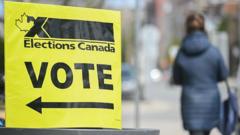With only days remaining before the election on April 28, more than 7 million Canadians have already voted in advance polling, exceeding previous turnout records and reflecting vibrant civic participation.
Early Voter Turnout Soars in Canada with 7.3 Million Ballots Cast

Early Voter Turnout Soars in Canada with 7.3 Million Ballots Cast
Record early voting figures indicate heightened political engagement in the lead-up to Canada's election.
As Canadians prepare for the crucial federal election, the population is demonstrating a strong inclination to engage, with a reported 7.3 million ballots cast during the early voting period. Elections Canada disclosed this information after the advance polling stations operated over the Easter long weekend. This determined turnout of nearly 25% of eligible voters marks a substantial increase of 25% over the last election cycle in 2021.
Elections Canada reports that more than 754,000 voters opted for mail-in voting this cycle, surpassing last election’s figure of 660,000. The surge in early participation allows for significant insights into the political landscape as the nation approaches election day. The federal leaders are in intense campaigning mode, focusing their efforts on critical issues, including strained trade relations with the US under the Trump administration.
Current polls reveal that the Liberal party leads with a 5-point margin over the Conservative party, an uplift for them after a challenging period following Trudeau's resignation announcement. Liberal leader Mark Carney emphasized his party's competence in managing relations with Trump as key to their campaign, while Conservative leader Pierre Poilievre has been advocating for a shift in government direction, particularly addressing issues such as housing, crime, and living costs amidst criticisms of government expenditure.
Polling indicates that the Bloc Quebecois is currently in third position while the New Democratic Party is trailing behind. The upcoming election not only serves as a referendum on Canada’s current leadership but also reflects a burgeoning political consciousness among voters eager for change.
This upcoming election underscores critical matters impacting Canadians today, including cross-border trade and socio-economic issues, shaping the perspectives of voters as they prepare to make their voices heard on April 28.
Elections Canada reports that more than 754,000 voters opted for mail-in voting this cycle, surpassing last election’s figure of 660,000. The surge in early participation allows for significant insights into the political landscape as the nation approaches election day. The federal leaders are in intense campaigning mode, focusing their efforts on critical issues, including strained trade relations with the US under the Trump administration.
Current polls reveal that the Liberal party leads with a 5-point margin over the Conservative party, an uplift for them after a challenging period following Trudeau's resignation announcement. Liberal leader Mark Carney emphasized his party's competence in managing relations with Trump as key to their campaign, while Conservative leader Pierre Poilievre has been advocating for a shift in government direction, particularly addressing issues such as housing, crime, and living costs amidst criticisms of government expenditure.
Polling indicates that the Bloc Quebecois is currently in third position while the New Democratic Party is trailing behind. The upcoming election not only serves as a referendum on Canada’s current leadership but also reflects a burgeoning political consciousness among voters eager for change.
This upcoming election underscores critical matters impacting Canadians today, including cross-border trade and socio-economic issues, shaping the perspectives of voters as they prepare to make their voices heard on April 28.



















